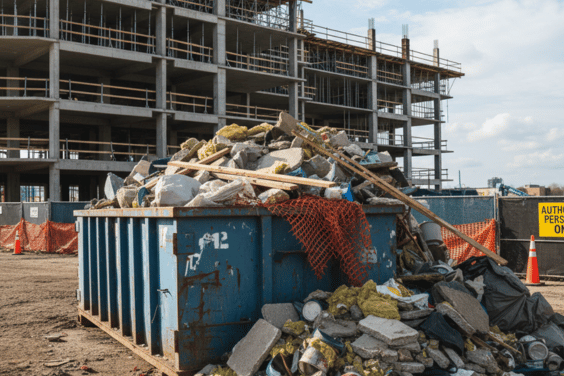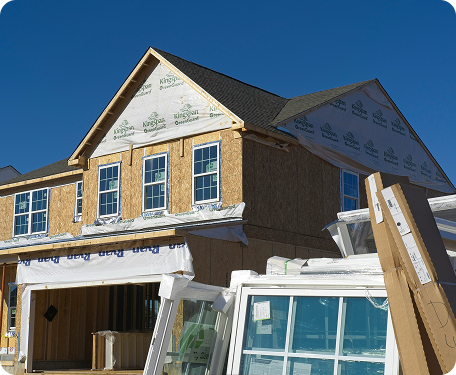Debris Removal Insurance: Hauling & Disposal Coverage


Get tailored and hassle-free debris removal insurance with ContractorNerd


CONTRACTOR-SPECIALIST INSURANCE PROVIDERS








We cover what matters on the job.
Most insurance agents have no clue what debris removal contractors actually deal with. We do. From dump runs to demo cleanups, we know the hazards, the liability exposures, and what it takes to keep your operation protected.
Debris Removal Insurance, Remodeled
Finding insurance that fits debris removal work isn’t easy. Most agents don’t understand hauling, demo cleanup, or the equipment you run. At ContractorNerd, we’ve built a quote platform specifically for contractors like you.

Faster, Simpler, Better
As trades-only specialists focused on debris removal, we’ve rebuilt the insurance experience to be faster, simpler, and more effective.

Compare in one place
Our technology connects directly with insurers who understand hauling operations and job site cleanup, while our specialized agents guide you through the process.

Solutions for Any Size
Whether you’re running one truck or a full fleet, our platform delivers what you need without the complexity or delays of traditional insurance.
What Is Debris removal Insurance?
ContractorNerd has done the research to bring you a clear picture of insurance requirements for debris removal contractors. Our analysis of debris removal quotes across all 50 states provides transparency on what coverage you need and current market rates.
Key Takeaways
- Debris Removal Insurance, Remodeled
- What Is Debris removal Insurance?
- What Debris Removal Insurance Do You Need?
- Debris Removal General Liability Insurance Coverage
- How Much Does Debris Removal Insurance Cost?
- Debris Removal Workers Comp Insurance Requirements
- Insurance For Debris Removal Business That Expands Into Other Trades
- Additional Debris Removal Insurance Coverage Options
What Debris Removal Insurance Do You Need?
For debris removal contractors, securing the right coverage is crucial and needs change based on the size and stage of your business. Here’s a guideline:
For Solo Operators
1-3 Employees
For Small Debris Removal Businesses
5+ Employees
For Established Debris Removal Businesses
Essential Coverage
Debris Removal Liability Insurance (General Liability)
Your core protection against property damage and bodily injury claims. This is what GCs and property owners mean when they ask if you’re insured.
Ongoing Operations
Covers damage while you’re hauling, loading, or clearing a site
Completed Operations
Protection for claims that arise after the job is done, like debris left behind that causes an injury or damage
Contractor License Bonds
Required for municipal hauling contracts and some commercial jobs. Proves you’ll dispose of materials properly and finish what you started.
Recommended Additional Coverage
Tools and Equipment Coverage (Inland Marine)
Protects your loaders, grapple trucks, skid steers, and trailers
Contractor’s Errors & Omissions
Covers claims of incomplete removal, improper disposal, or damage from debris you missed
Commercial Auto
Essential for your dump trucks, roll-offs, and hauling vehicles
Workers Compensation
Required when you hire employees (not needed for subcontractors)
Environmental Liability
Covers pollution claims from dust, runoff, or hazardous materials encountered during cleanup
Commercial Property
Covers your equipment yard, storage areas, and offices
Umbrella Insurance
Extra liability protection as your fleet and job volume grow
Employment Practices Liability (EPLI)
Protection against employee-related lawsuits




































For Solo Operators
Essential Coverage
Recommended Additional Coverage
For Small Debris Removal Businesses
2-3 Employees
All previous coverages, plus:
For Established Debris Removal Businesses
All previous coverages, plus:
Debris Removal General Liability Insurance Coverage
If there was a single coverage critical for all debris removal contractors, this is it. General Liability Insurance provides essential protection because your work involves daily risks: heavy equipment on client properties, flying debris, loads shifting in transit, and crews working around active construction sites.
Core protection includes

Bodily Injury
A bystander, site worker, or property owner getting hurt by falling debris, equipment operations, or truck movements.

Property
Damage
Accidental damage to driveways, landscaping, fencing, utilities, or structures during loading and hauling.
Add-On

Completed
Work
Claims that surface after you’ve left the site, like injuries from debris you missed or damage from improper disposal.
Liability Limits for Debris Removal Contractors
Typically, $1 million per occurrence and $2 million aggregate. Most GCs and municipal contracts require at least $1 million. Upgrading from $500k to $1M coverage usually slightly increases premiums but provides significantly better defense.
Classification Codes
Debris removal contractors typically use class code 91629, which covers construction site cleanup performed in connection with projects by other contractors.
Key Factors Influencing Liability Quotes

Revenue
Higher revenue implies more work and higher risk, leading to increased quotes.

Policy Limits
Higher limits for specific projects or contracts may raise quotes.

Claims History
A history of frequent claims can result in higher quotes, similar to auto insurance.

Location
States with stricter regulations may have higher insurance quotes.

Services Offered
Demo cleanup, construction site work, and jobs involving heavy equipment carry different risk profiles than basic junk hauling.
How Much Does Debris Removal Insurance Cost?
Quote Study Findings
Quotes generally amount to 0.6% to 7.6% of annual revenue. Our analysis of General Liability insurance quotes from leading carriers reveals significant variations across different states and business sizes.
We analyzed quotes based on these business profiles
Revenue
$150K
1 owner with 1 truck and 5+ years operating without claims
Revenue
$500K
1 owner and 3 employees with a small fleet and 5+ years operating without claims
Revenue
$1M
1 owner and 5 employees with multiple trucks and 5+ years operating without claims
We analyzed quotes based on these business profiles
Revenue Level
National Average
Favorable Rate
Potential Savings
Low % of Revenue
High % of Revenue
$150,000
$1,670
$1,330
20%
0.6%
1.7%
$500,000
$3,130
$2,120
32%
1.0%
3.4%
$1,000,000
$7,150
$3,990
44%
2.5%
7.6%
State-by-State Pricing Insights
To help debris removal contractors better understand regional pricing variations, we’ve developed an in-depth resource examining debris removal insurance premiums in every state nationwide. This state-specific analysis reveals how local factors impact your actual costs and identifies opportunities for savings in your market. Explore our comprehensive guide to debris removal insurance cost by state for detailed premium breakdowns.

Debris Removal Workers Comp Insurance Requirements
Workers’ Compensation Insurance is essential for debris removal contractors, providing coverage for employee injuries or illnesses related to work. The premiums are based on job risk, classified by the National Council on Compensation Insurance (NCCI) into class codes. Debris removal contractors typically fall under code 5610, with rates usually between $4 to $6 per $100 of employee payroll annually.
WC Policy Limits for Debris Removal Contractors
These are often unlimited but can vary according to state regulations.
WC Rates for Debris Removal Contractors
Between $4 and $6 per $100 of payroll.
Key Factors Influencing WC Premiums for Debris Removal Contractors

Class Codes
Group employees by job type and risk; higher risk means higher premiums. Debris removal contractors commonly use code 5610.

State Regulations
States dictate workers’ compensation laws, influencing benefits and baseline rates. Geographic differences in living and healthcare costs also affect premiums.

Experience modifier
Reflects your safety record, starting at 1.0 and adjusting based on claims history. More incidents result in higher modifiers and premiums.

Payroll Size
Calculated as (payroll / $100) * rate * experience modifier, with larger payrolls leading to higher premiums
This insurance is typically mandatory if you have employees. It covers employee medical expenses, rehabilitation, lost wages, and even death benefits in case of job-related injuries or illnesses. For employers, it also provides legal coverage and compensation in case of employee lawsuits related to occupational injuries or illnesses.
Insurance For Debris Removal Business That Expands Into Other Trades
If you’re a debris removal contractor who’s branched out into demolition, landscaping, or hauling specialty materials, your standard debris removal insurance isn’t going to cut it. The work is different, the risks are different, and your coverage needs to reflect that.
Taking on demolition work? You need coverage that goes beyond hauling debris away. Structural collapse, flying materials, and damage to adjacent properties require demolition contractor insurance, not just debris removal liability.
Offering landscaping services? Clearing brush and grading sites is just part of the job. Tree removal, irrigation damage, and equipment operations on finished properties need landscaping contractor coverage. Your debris removal policy won’t protect you when a client claims you damaged their lawn or sprinkler system.
Doing tree work or land clearing? Dropping trees and grinding stumps carries serious liability. Damage to structures, power lines, and neighboring properties requires tree service insurance, not just a debris hauling policy.
The bottom line: If you’re doing the work, you need the insurance. Don’t assume your debris removal policy covers these expanded services. A single uncovered claim from demo, tree work, or landscaping can wipe out years of profit.
Talk to your insurance provider about adding trade-specific coverage, or you’re gambling every time you take on one of these jobs.

Insurance For Debris Removal Business That Expands Into Other Trades
Additional Debris Removal Insurance Coverage Options
As your debris removal business expands, these additional coverage types merit careful consideration beyond your core insurance portfolio:
Surety Bonds for Debris Removal Contractors
These financial guarantees demonstrate your commitment to completing jobs and disposing of materials properly while satisfying municipal and commercial contract requirements. Bond requirements commonly range $5,000-$25,000, with annual premiums representing 1-3% of the bond amount. Your credit profile significantly influences pricing.
Quote Summary by Revenue Level
Bond Required
Top-Tier Credit
Standard Credit
Challenged Credit
$5,000
$100-$150
$150-$200
$200-$400
$10,000
$100-$300
$300-$500
$500-$1,000
$15,000
$150-$400
$400-$750
$750-$1,500
$20,000
$180-$500
$500-$1,000
$1,000-$2,000
$25,000
$200-$500
$500-$1,200
$1,200-$2,500
Requirements vary by contract type. Municipal hauling jobs and government cleanups typically require bonds, while smaller residential work often does not.
Frequently Asked Questions
What kind of insurance do debris removal contractors need?
You need General Liability at minimum, covering property damage and bodily injury claims (typically $1M/$2M limits). Once you hire employees, Workers’ Comp becomes mandatory. Smart contractors also grab Inland Marine coverage for their equipment and Commercial Auto for their trucks. Surety bonds may be required for municipal contracts.
How much is insurance for a debris removal contractor?
Expect to pay 0.6%-7.6% of annual revenue for General Liability, so around $3,130 yearly at $150K revenue or $7,150 at $500K revenue. Workers’ comp adds $4-$6 per $100 of payroll (class code 5610). Rates vary significantly by state and claims history.
How much insurance per occurrence must debris removal contractors maintain?
Most GCs and municipal contracts require $1 million per occurrence and $2 million aggregate for General Liability. Larger commercial jobs or government cleanup contracts may require higher limits. Your Commercial Auto policy should carry adequate liability limits based on the size of your fleet and the value of loads you haul.













